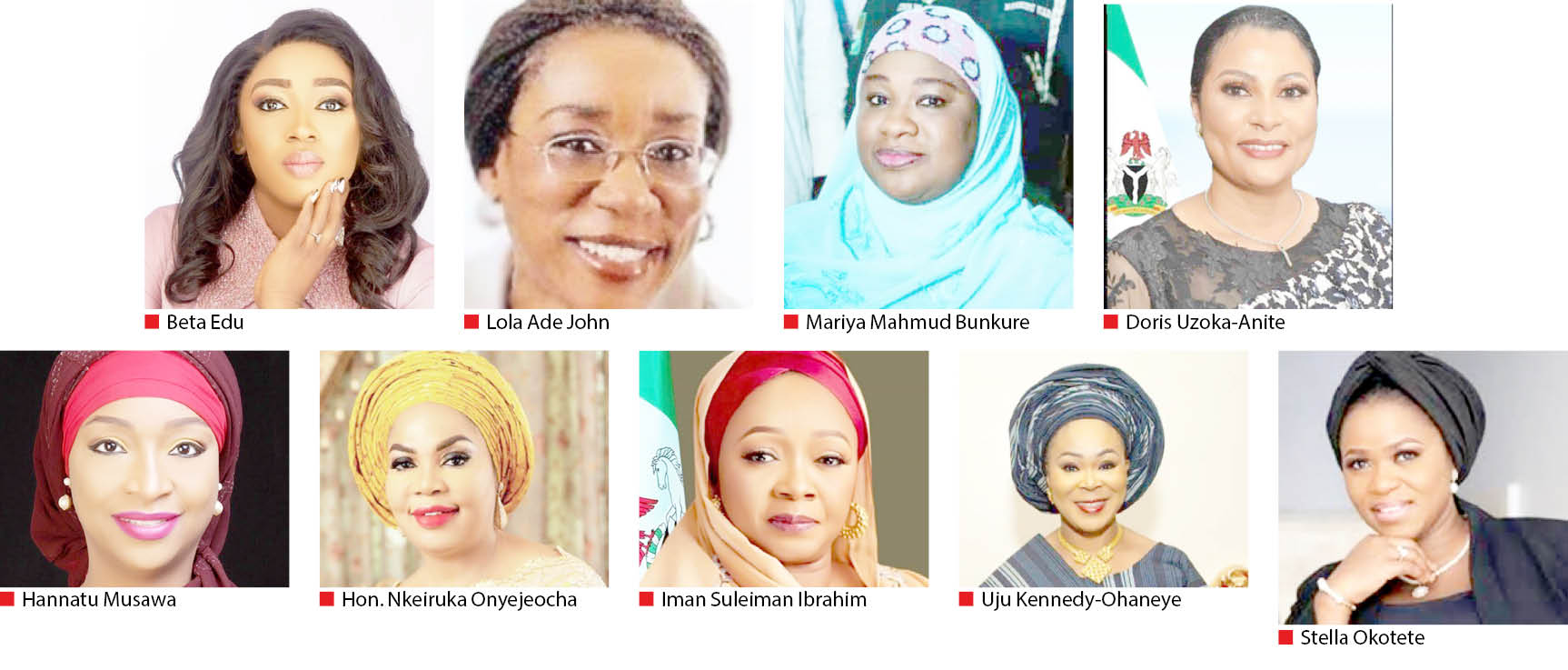It is against the backdrop of promises for inclusion of women in all governmental positions that women groups and activists eagerly awaited President Bola Tinubu’s ministerial list.
The first tranche of 28 ministerial nominees was submitted to the National Assembly on July 27 and seven of them were women. On Wednesday, the second batch of 19 nominees was forwarded to the Senate.
Among a total of 47 nominees, women got 9 slots, representing 19.14 per cent, which falls short of the 35 per cent benchmark President Tinubu promised women in his government.
Daily Trust Saturday reports that in the Tinubu/Shettima “Action Plan for a Better Nigeria” document, the current administration promised women 35 per cent of all positions. The document stated, “Equity and fairness to women will be a top priority of a Tinubu government. Working with the National Assembly, we will aim to pass legislation promoting female employment in all government offices, ministries and agencies. The goal will be to increase women’s participation in government to at least 35 per cent of all governmental positions.”
- Strike: FG implements ‘no work, no pay policy’ against resident doctors
- Police arrest 12 kidnap suspects, rescue 10 victims in Bauchi
We are not happy – Women groups
Lamenting that no government has ever met the 35 per cent minimum for women, the chief executive officer of the Nigeria Women Trust Fund, Mufuliat Fijabe, told Daily Trust Saturday that no government had ever met the 35 per cent minimum for women. She said women were not happy because the president failed to fulfill his campaign promise.
“We have been advocating a minimum of 35 per cent. We were hopeful that the president would do more so that we could at least meet the minimum benchmark at the national level. We are still looking forward for him to do the needful,” she said.
The chairperson of Women in Politics Forum, Ebere Ifendu, also said they expected that the ministerial list would contain more women, but the percentage rather dropped from 25 to 19. “There’s not much to talk about, it is not right,” she said.
Despite having a population of 49.5 per cent, according to a 2022 World Bank report, women constituted nearly half of the number of registered voters in the last elections in Nigeria, but political participation of the gender remained far below the world and African continent standards.
Lagging bellow the global average of 22.5 per cent, African regional average of 23.4 per cent and West African sub-regional average of 15 per cent, Nigeria has been said to remain at 6.7 per cent in women political participation
The following women made President Tinubu’s ministerial list.
Hannatu Musawa
Hannatu is a lawyer and founder of Hanney Musawa and Associates. She is currently the special adviser to President Bola Tinubu on culture and entertainment economy. She was a deputy spokesperson of the All Progressives Congress Presidential Campaign Council.
The daughter of a veteran Nigerian politician, Alhaji Musa Musawa, hails from Katsina State and is of the Fulani extraction.
She holds a degree in Law from the University of Buckingham, United Kingdom and a postgraduate degree in Marine Affairs from the University of Cardiff, Wales. She also has a postgraduate degree in Oil and Gas Law from the University of Aberdeen.
Betta Edu
Betta Edu, the national woman leader of the All Progressives Congress (APC), was born on October 27, 1986. She was the youngest to occupy that position in March 2022.
She was the commissioner for health in Cross River State until her resignation in 2022. She was also the national chairman of the Nigeria Health Commissioners Forum.
Doris Uzoka-Anite
Uzoka-Anite, a medical doctor and CFA charter holder, was a commissioner for finance in Imo State. With a banking career that spans human resources and treasury, she amassed significant experience in the financial market. She oversaw the fixed income and currency trading desks, asset and liability management, treasury corporate sales, and financial multilateral institutions. Earlier in July, she was nominated to speak on behalf of the federal government. Addressing newsmen, she discussed the suspension of tax on telecom services.
Nkeiruka Onyejeocha
She was born to the family of Eze Bob Ogbonna in Isuochi in Umunneochi Local Government Area of Abia State. She attended Isuochi Central Primary School and Ovim Girls’ School, Isuochi. In 1988, she graduated from the University of Nigeria, Nsukka, with a diploma in Social Work/Community Development. In 1993 she bagged a Bachelor of Art degree with a second class honour (upper division) from the same university.
She holds a master’s degree in International Affairs and Diplomacy and another master’s degree in Shipping from the Ladoke Akintola University of Technology, Oyo State.
Nkeiruka was a lawmaker in the Federal House of Representatives, where she represented Isiukwuato/Umunneochi constituency of Abia State. The former House deputy whip lost her re-election bid to Amaobi Ogah, the candidate of the Labour Party (LP) in February.
Stella Okotette
Stella Okotete hails from Ekrerhavwen-Agbarho community in Ughelli North Local Government Area of Delta State. She was born on April 20, 1984.
She holds a Bachelor of Arts degree in International Studies and Diplomacy from the Benson Idahosa University in Benin City, as well as master’s degrees in Public Administration, Peace and Conflict Resolution. Stella also has a diploma in Law from the Rivers State College of Arts and Sciences. She was the national woman leader of the APC.
In April 2017, she was appointed by former President Muhammadu Buhari as the executive director, Business Development of the Nigerian Export-Import Bank (NEXIM).
She is the co-founder of the E’Girls Right Foundation, through which she has engaged with internally displaced persons at their camps in Ughelli, Maiduguri, and Abuja.
Uju Kennedy-Ohaneye
Uju is an Abuja-based philanthropist and politician. She was the only female presidential aspirant of the APC in the build-up to the 2023 general elections. She gave up her ambition for President Tinubu.
She is a businesswoman who is said to be into real estate and education.
Iman Suleiman Ibrahim
Iman was the director-general of the National Agency for the Prohibition of Trafficking in Persons (NAPTIP) from December 2020 to May 2021. Afterwards, she was redeployed as a commissioner in the National Commission for Refugees, Migrants, and Internally Displaced Persons.
She attended Aruwa Nursery School, Abuja and Jabi Primary School (LEA Primary School, Jabi) before proceeding to Federal Government Girls’ College, Bwari, Abuja. She obtained a degree in Sociology at the age of 19 from the University of Abuja and later got master’s degrees from Webster University.
Although she is from Keffi in Nasarawa State, Mrs Ibrahim was born in Jos, Plateau State, and raised in Abuja, the Nigerian capital city.
Lola Ade John
Lola is an information and technology expert with a vast experience in designing, integrating, deploying and managing core systems for banking institutions. She has been at the forefront of leveraging technology to drive strategic business results and improve operations in small, medium and large-scale working environments.
She attended the University of Ibadan in 1984, where she obtained a B.Sc in Computer Science.
She had a flourishing career with reputable organisations, home and abroad and is presently the principal consultant at Novateur Business Technology Consultants, a company she founded in 2014.
Since Nigeria committed to gender inclusion by becoming a signatory to international agreements on responsive and balanced environment, concerned groups have watched closely to ensure that such commitments are backed with action in all sectors.
Mariya Mahmud Bunkure
Mariya was the commissioner for higher education in Kano State during the tenure of former Governor Alhaji Abdullahi Umar Ganduje.
Mariya was born in Bunkure town of Kano State, where she spent her early days which included her basic education.
She was announced on the 4th of August, 2023 at the senate plenary as a ministerial nominee to replace Maryam Shetty who was earlier nominated from Kano state.
Daily Trust Saturday reports that Nigeria and many African countries have been unable to meet a 30 per cent benchmark for women in leadership positions, but other countries in the continent have fared well in this regard.
One notable reason for lower female representation in the region has been blamed on the nature of politics in Africa, which is expensive; hence women are often at a disadvantage as they are unable to meet up with the financial requirements of various political parties and campaigns.
Moreover, ministerial appointments are often singlehandedly carried out by heads of governments without laws that set quotas for both genders.
Although countries like Rwanda, The Gambia, South Africa, Uganda and Burundi have exceeded the 35 per cent of women in ministerial appointments, the continent is still within an average female representation of 20 per cent.

 Join Daily Trust WhatsApp Community For Quick Access To News and Happenings Around You.
Join Daily Trust WhatsApp Community For Quick Access To News and Happenings Around You.


